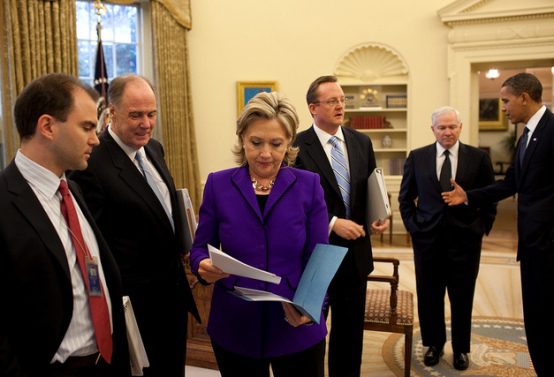How to pour out the tea
Establishment Republicans are wondering how to control this tempest in the Tea Party pot. They could do worse than look at my home state of Wisconsin, where the party’s endorsed candidates not only won but won their primaries handily against non-establishment contenders, some of whom were local Tea Party endorsed. This was true not only in U.S. House races but state legislative races as well. (The Tea Party candidates I met at an event back in March who were running for the state legislature all lost.)
There are plenty of Tea Party activist groups around the state, but what good are activists when there’s not much of an electorate to get activated? Far from being a state with a lot of high-tech voters or any kind of caucus system (like neighboring Minnesota) — where activists can project power greater than their numbers through organization and just by showing up — campaigns in Wisconsin are still run largely on television. And that means whoever can write the biggest check come Labor Day when TV ad buys are made for the fall is generally the winner. The Tea Party-endorsed GOP U.S. Senate candidate Dave Westlake may well have traveled 75,000 miles across the state and marched in every small-town festival parade he could find. But such grassroots campaigning was dwarfed by the millions Oshkosh businessman Ron Johnson pumped into his TV ad budget, and the result was Westlake only carrying 10 percent of the vote. Thus, Johnson could stiff Tea Party campaign forums, largely on advice of campaign handlers who wanted to keep the first-time candidate from saying anything stupid, and still won easily because in Wisconsin politics, he who has the most TV ads wins. One of the other candidates in the U.S. Senate primary hardly campaigned at all and still won five percent, half of what Westlake took.
This kind of “checkbook politics” has been going on in the state for some time. Political parties in Wisconsin are supposed to be weak, a design from the days of Robert LaFollette Sr. But without a strong party structure across the state (county and local parties tend either to be decently organized or not at all depending who is in charge), power is increasingly centralized in the hands of the political class in Madison or in well-organized non-party groups like the statewide teacher’s union or the business lobby, who make big TV ad buys that ensure their candidates’ victories in races for school superintendent or the state supreme court because no one else has the money to stay on television.
Would a nice contribution from Sen. Jim DeMint or some national Tea Party group or an endorsement from Sarah Palin have helped Westlake? Perhaps, but not enough to win. Gubernatorial candidate and former congressman Mark Neumann spent part of his own home-building business fortune against the party establishment’s candidate, Milwaukee County Executive Scott Walker, and all it got him was 38 percent of the vote. The party establishment benefits not only from the lack of grassroots consciousness in the state, but also from the fact that the state’s Republican base is becoming more and more concentrated in Milwaukee, i.e., the suburbs surround the Democratic city whose mayor is also running for governor. And those voters are under the sway of three radio talk-show hosts at the city’s two largest AM stations. So long as those hosts believe that they basically control the party in the state’s most populous region, the establishment is happy because it means there’s no disruptive third force (the way Tea Parties are in many states on the right) that could threaten establishment power. If there’s going to be any local activism, this trio believes they should be the ones who are going to lead it, not some rinky-dink Tea Party group in Stevens Point, and there’s nothing those outside the Milwaukee area can do about it. Neumann carried 49 of the state’s 72 counties and it didn’t matter a lick because Walker swamped him where it counted as far as Republicans were concerned.
Some in the outstate Tea Parties are pondering their next moves as far as Johnson is concerned, but really, does it matter? The most manufactured political campaign in state history succeeded because of the Golden Rule, and he’s betting every dime he’s got he can overwhelm Sen. Russ Feingold in the same fashion. Dave Westlake told me in an interview that “we’ve tried beating Russ Feingold with more money. Why not try to beat him with more votes?” It remains to be seen whether more money leads to more votes in a general election but it certainly does in primaries and other low-turnout elections as far as Wisconsin is concerned.
And as party leaders gather to communicate and talk shop, they will certainly pick the brain of Wisconsin State GOP Chairman Reince Priebus to find out how he handled the Tea Parties successfully in his state: 1. Get the most listened to talk-show hosts in your state’s biggest city on your side; 2. Find well-known candidates from the biggest bloc of voters in the most populous region of your state; 3. Make sure they’re well-funded and then present a fait accompli to Tea Partiers and tell them to start picking votes if they want any place at the table at all. Wisconsin has its own ways of politics unique to itself but don’t be surprised to see such strategies tried elsewhere. Many Tea Party leaders have the hubris to believe that they themselves are going to be running state and local parties after the success of Tea Party-backed candidates in primaries this year. They should be well aware of what they’re going to up against. How many times have we heard it said over the past 40 years that “Conservatives have got to retake the Republican Party”?
